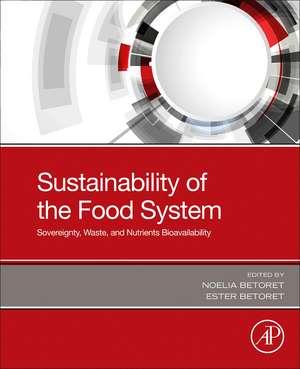Sustainability of the Food System: Sovereignty, Waste, and Nutrients Bioavailability
Editat de Noelia Betoret, Ester Betoreten Limba Engleză Paperback – 3 feb 2020
Sustainability of the Food System: Sovereignty, Waste, and Nutrients Bioavailability will serve as a welcomed resource for food scientists and technologists, agriculturists, agronomic engineers, food engineers, environmental technologists, nutritionists, and post-graduate students studying bioresource technology and sustainability.
- Addresses global sustainability as a three-dimensional concept
- Describes the use and recovery of crops with high content in bioactive compounds as a preliminary and necessary step to achieve food sovereignty
- Presents advances in the development of environmentally friendly food processes that reduce and revalue food waste and byproducts
- Considers the development of functional foods with innovative food technologies that increase the bioavailability of nutrients and bioactive compounds to achieve social and economic sustainability
Preț: 594.38 lei
Preț vechi: 816.89 lei
-27% Nou
Puncte Express: 892
Preț estimativ în valută:
113.73€ • 119.07$ • 94.11£
113.73€ • 119.07$ • 94.11£
Carte tipărită la comandă
Livrare economică 31 martie-14 aprilie
Preluare comenzi: 021 569.72.76
Specificații
ISBN-13: 9780128182932
ISBN-10: 0128182938
Pagini: 216
Dimensiuni: 191 x 235 x 9 mm
Greutate: 0.38 kg
Editura: ELSEVIER SCIENCE
ISBN-10: 0128182938
Pagini: 216
Dimensiuni: 191 x 235 x 9 mm
Greutate: 0.38 kg
Editura: ELSEVIER SCIENCE
Public țintă
Food scientists and technologists, agriculturists, agronomic engineers, food engineers, environmental technologists, nutritionists, and post-graduate students studying bioresource technology and sustainabilityCuprins
Part I: Food Sovereignty
1. Traditional varieties with high content in bioactive compounds and functional raw materials for an increased biodiversity
2. Crop and cultivation processes to avoid soil degradation
3. Cultivated varieties and proximity consumption rule to decrease carbon footprint
Part II: Food production and food waste valorization
4. Biofuels from food processing by-products
5. Food industry by-products revalorization and new ingredients: Cases of study
6. Use of by-products in edible films and packaging
Part III: Innovative food technologies and nutrients bioavailability
7. Development of functional foods by traditional food processes
8. Effect of non-thermal technologies on functional food compounds
9. Probiotics and nutrition: use of probiotics to improve antioxidant properties and bioavailability of food compounds
Additional Chapter. Globalization of Technologies: Pros and Cons
1. Traditional varieties with high content in bioactive compounds and functional raw materials for an increased biodiversity
2. Crop and cultivation processes to avoid soil degradation
3. Cultivated varieties and proximity consumption rule to decrease carbon footprint
Part II: Food production and food waste valorization
4. Biofuels from food processing by-products
5. Food industry by-products revalorization and new ingredients: Cases of study
6. Use of by-products in edible films and packaging
Part III: Innovative food technologies and nutrients bioavailability
7. Development of functional foods by traditional food processes
8. Effect of non-thermal technologies on functional food compounds
9. Probiotics and nutrition: use of probiotics to improve antioxidant properties and bioavailability of food compounds
Additional Chapter. Globalization of Technologies: Pros and Cons
